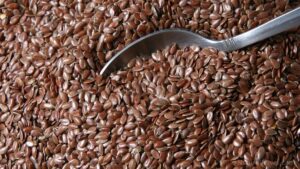
Flaxseeds or linseeds are a key ingredient in my food bars.
Researchers in India evaluated the antimicrobial activity of flaxseed against known periodontal pathogens. They reported their findings in an article published in the International Journal of Herbal Medicine.
Research suggests that the use of antibiotics is beneficial in the management of periodontitis.
However, antibiotic resistance has now become a major global issue, and it is believed to have stemmed from the misuse of antibiotics.
Many researchers now see herbal interventions as therapeutic strategies that deserve more research and attention.
Flaxseed, a popular superfood rich in omega-3 fatty acids, has demonstrated potent antimicrobial and anti-biofilm activities in several studies.
To further explore its potential, the researchers conducted an in vitro study that aims to assess the antimicrobial activity of flaxseed against periodontal pathogens.
They prepared an ethanolic extract from flaxseed powder and determined its minimum inhibitory concentration (MIC) and minimum bactericidal concentration (MBC) against Porphyromonas gingivalis, Aggregatibacter actinomycetemcomitans and Tannerella forsythia.
The researchers reported that the flaxseed extract exhibited bacteriostatic activities against all three pathogens.
At 100 microliters (uL)/milliliter (mL), the extract exerted bactericidal effects against P. gingivalis.
Based on these findings, the researchers concluded that flaxseed can be used as a natural adjunct to periodontal therapy because of its bactericidal effects against P. gingivalis.
